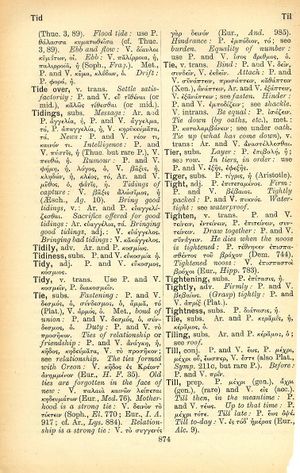tie: Difference between revisions
Ἴσον θεῷ σου τοὺς φίλους τιμᾶν θέλε → Honora amicos tamquam honorares deos → Verehre willig deine Freunde Göttern gleich
(Woodhouse 5) |
(CSV5) |
||
| Line 1: | Line 1: | ||
{{ | {{Woodhouse1 | ||
| | |Text=[[File:woodhouse_874.jpg|thumb|link={{filepath:woodhouse_874.jpg}}]]'''subs.''' | ||
<b class="b2">Fastening</b>: P. and V. [[δεσμός]], ὁ, [[σύνδεσμος]], ὁ, [[ἅμμα]], τό (Plat.), V. [[ἁρμός]], ὁ. | |||
Met., <b class="b2">bond of union</b>: P. and V. [[δεσμός]], ὁ, [[σύνδεσμος]], ὁ. | |||
<b class="b2">Duty</b>: P. and V. τὸ προσῆκον. | |||
<b class="b2">Ties of relationship</b> or <b class="b2">friendship</b>: P. and V. [[ἀνάγκη]], ἡ, [[κῆδος]], κηδεύματα, V. τὸ προσῆκον; see [[relationship]]. | |||
<b class="b2">The ties formed with Creon</b>: V. [[κῆδος]] ἐς Κρέοντʼ ἀνημμένον (Eur., <b class="b2">H. F.</b> 35). | |||
<b class="b2">Old ties are forgotten in the face of new</b>: V. παλαιὰ καινῶν λείπεται κηδευμάτων (Eur., ''Med.'' 76). | |||
<b class="b2">Motherhood is a strong tie</b>: V. δεινὸν τὸ τίκτειν (Soph., ''El.'' 770; Eur., ''I. A.'' 917; cf. Ar., Lys. 884). | |||
<b class="b2">Relationship is a strong tie</b>: V. τὸ συγγενὲς γὰρ δεινόν (Eur., ''And.'' 985). | |||
<b class="b2">Hindrance</b>: P. ἐμπόδιον, τό; see [[burden]]. | |||
<b class="b2">Equality of number</b>: use P. and V. [[ἴσος]] ἄριθμος, ὁ. | |||
'''v. trans.''' | |||
<b class="b2">Bind</b>: P. and V. [[δεῖν]], συνδεῖν, V. ἐκδεῖν. | |||
<b class="b2">Attach</b>: P. and V. συνάπτειν, προσάπτειν, καθάπτειν (Xen.), ἀνάπτειν, Ar. and V. ἐξάπτειν,V. ἐξανάπτειν; see [[fasten]]. | |||
<b class="b2">Hinder</b>: P. and V. ἐμποδίζειν; see [[shackle]]. | |||
V. intrans. <b class="b2">Be equal</b>: P. ἰσάζειν. | |||
<b class="b2">Tie down</b> (by oaths, etc.), met.: P. καταλαμβάνειν; see under [[oath]]. | |||
<b class="b2">Tie up</b> (what has come down), v. trans.: Ar. and V. ἀναστέλλεσθαι. | |||
}} | }} | ||
Revision as of 10:06, 21 July 2017
English > Greek (Woodhouse)
subs.
Fastening: P. and V. δεσμός, ὁ, σύνδεσμος, ὁ, ἅμμα, τό (Plat.), V. ἁρμός, ὁ.
Met., bond of union: P. and V. δεσμός, ὁ, σύνδεσμος, ὁ.
Duty: P. and V. τὸ προσῆκον.
Ties of relationship or friendship: P. and V. ἀνάγκη, ἡ, κῆδος, κηδεύματα, V. τὸ προσῆκον; see relationship.
The ties formed with Creon: V. κῆδος ἐς Κρέοντʼ ἀνημμένον (Eur., H. F. 35).
Old ties are forgotten in the face of new: V. παλαιὰ καινῶν λείπεται κηδευμάτων (Eur., Med. 76).
Motherhood is a strong tie: V. δεινὸν τὸ τίκτειν (Soph., El. 770; Eur., I. A. 917; cf. Ar., Lys. 884).
Relationship is a strong tie: V. τὸ συγγενὲς γὰρ δεινόν (Eur., And. 985).
Hindrance: P. ἐμπόδιον, τό; see burden.
Equality of number: use P. and V. ἴσος ἄριθμος, ὁ.
v. trans.
Bind: P. and V. δεῖν, συνδεῖν, V. ἐκδεῖν.
Attach: P. and V. συνάπτειν, προσάπτειν, καθάπτειν (Xen.), ἀνάπτειν, Ar. and V. ἐξάπτειν,V. ἐξανάπτειν; see fasten.
Hinder: P. and V. ἐμποδίζειν; see shackle.
V. intrans. Be equal: P. ἰσάζειν.
Tie down (by oaths, etc.), met.: P. καταλαμβάνειν; see under oath.
Tie up (what has come down), v. trans.: Ar. and V. ἀναστέλλεσθαι.

